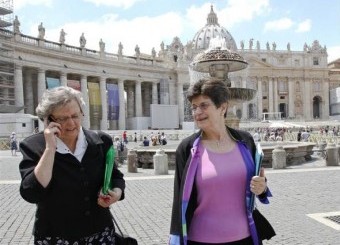Conference of American Nuns Will Mull Response to Vatican Charges
By Patricia Rice
In an NPR interview last week, LCWR President Sister Pat Farrell said that, in the two decades-plus since Pope John Paul II banned Catholic leaders from public discussion of ordaining women, the LCWR has never taken a stand on the issue nor had it been on the assemblies’ agendas. She also said every congregation of sisters had someone working on right to life issues. Some St. Louis sisters said they were dumbfounded by the right-to-life accusation since many sisters provide homes for pregnant women, educate them, represent them as lawyers, care for their older children, help those with troubled pregnancies by staffing Birthright offices and lead students on the annual Right to Life March on Washington in January. Those with long memories know that in 1979 the then LCWR president Sister Teresa Kane addressed Pope John Paul on a U.S. visit and asked about women entering more church ministries including the priesthood. Her question was just one of many worldwide that led the pope to silence church officials on the idea of women priests, saying the Roman Catholic Church could never allow it. Prayer and reflection What will the sisters do next week and after that? At a Thursday news conference, Farrell said she does not know. All living former presidents of the organization have been invited to attend a two-hour session and to be available to the members over the four days. “I feel it is very import for us to gather wisdom from the past,” Farrell said. The agenda calls for prayer and reflection. Leaders are to give updates on the meeting Farrell and the group’s executive director had in June with leaders of the Congregation of the Faith at the Vatican. Then the floor will be open to the assembled 900 sisters as Sister Mary Jo Nelson, a Victory Knoll sister and Sister Katherine Gray, a Sister of St. Joseph serve as facilitators to keep an orderly dialogue. There will be “time to listen to one another,” Farrell said. “We know that members will bring discernment about what they have been praying about, what they heard from other leaders.” Most have had listening sessions with their rank and file members across the country. And many have talked with the bishops of their own dioceses. Most of the “discernment sessions” on how to react to the Vatican assessment will be in closed sessions Wednesday and Thursday late afternoons and evenings. The leadership group has no tradition of taking a “person by person” vote, Farrell said. Instead the board will listen for consensus and come up with a statement about its next move. Or they may not decide on the next move by Friday, Farrell said. If they do agree on a statement about the LCWR’s next step, they will first tell it to the committee of three bishops who did the assessment. Farrell called it a courtesy to tell them first. Cardinal Levada assigned Seattle Archbishop Peter Sartain to study to see whether the nuns’ leadership group was acting in accordance with church teachings. He will be assisted by Bishop Thomas Paprocki of Springfield, Ill., and Bishop Leonard Blair of Toledo, who did much of the original assessment. Blair said he hopes there would be “revitalization of women religious life in this country” so they could continue to do what he called “tremendous work,” in an interview with Terry Gross on NPR. “If anything, part of our concern is precisely for their diminished numbers and their aging population." Other issues Since this spring, all participants have been asked not to discuss possible next steps publicly. That black-out continues until Friday. At Thursday’s news conference, Farrell said leaders of sisters across the country told her they were determined that their annual assemblies do business as usual. Much of the regular work of the annual gathering will continue, which includes following their tradition of making a strong action statement on human rights. This session it will be for all members to help educate the public about how to be alert to, and stop, human trafficking, which they call modern slavery. For several years, the Federation of the Sisters of St. Joseph of Carondelet has worked on that cutting-edge issue and was among those advocating LCWR take a stand on the issue. Helen Hitchcock, of St. Louis editor of the Catholic periodical “Women for Faith and Family” and “Adoremus,” said none of this surprised her. She said she’s been looking at the group for 40 years. She said many Catholic sisters she has interviewed say they are distressed that those in the ranks who disagree with the LCWR’s more radical agendas have no say and that many people think the group represents the rank and file. “There is a lack of strong support for many of the church’s teachings like right to life, against abortion,” Hitchcock said about the LCWR. Some of the rank and file sisters belong a more conservative network that is not restricted to leaders called the Institute on Religious Life, which includes both men and women. Members of the LCWR are only drawn from the current leaders of their communities. Some of the participants only took office as heads of their orders this summer and have never attended a LCWR meeting. Those who elected them are vowed Catholic religious women who serve in varied posts: hospital CEOs; doctors who lead clinics for the poor; hospice workers; university chancellors and presidents; lawyers, both canon (church) law and civil; professors with doctorates in theology, liturgy, church history; school principals; scientists; environmental leaders; social workers, and community organizers who work daily with the poor, elderly, immigrants and others on society’s margins.
|
.
Any original material on these pages is copyright © BishopAccountability.org 2004. Reproduce freely with attribution.
